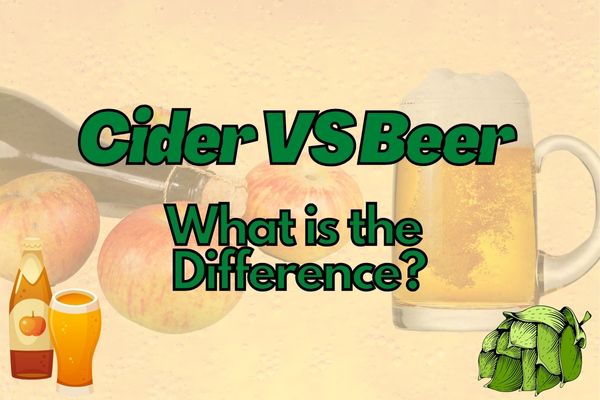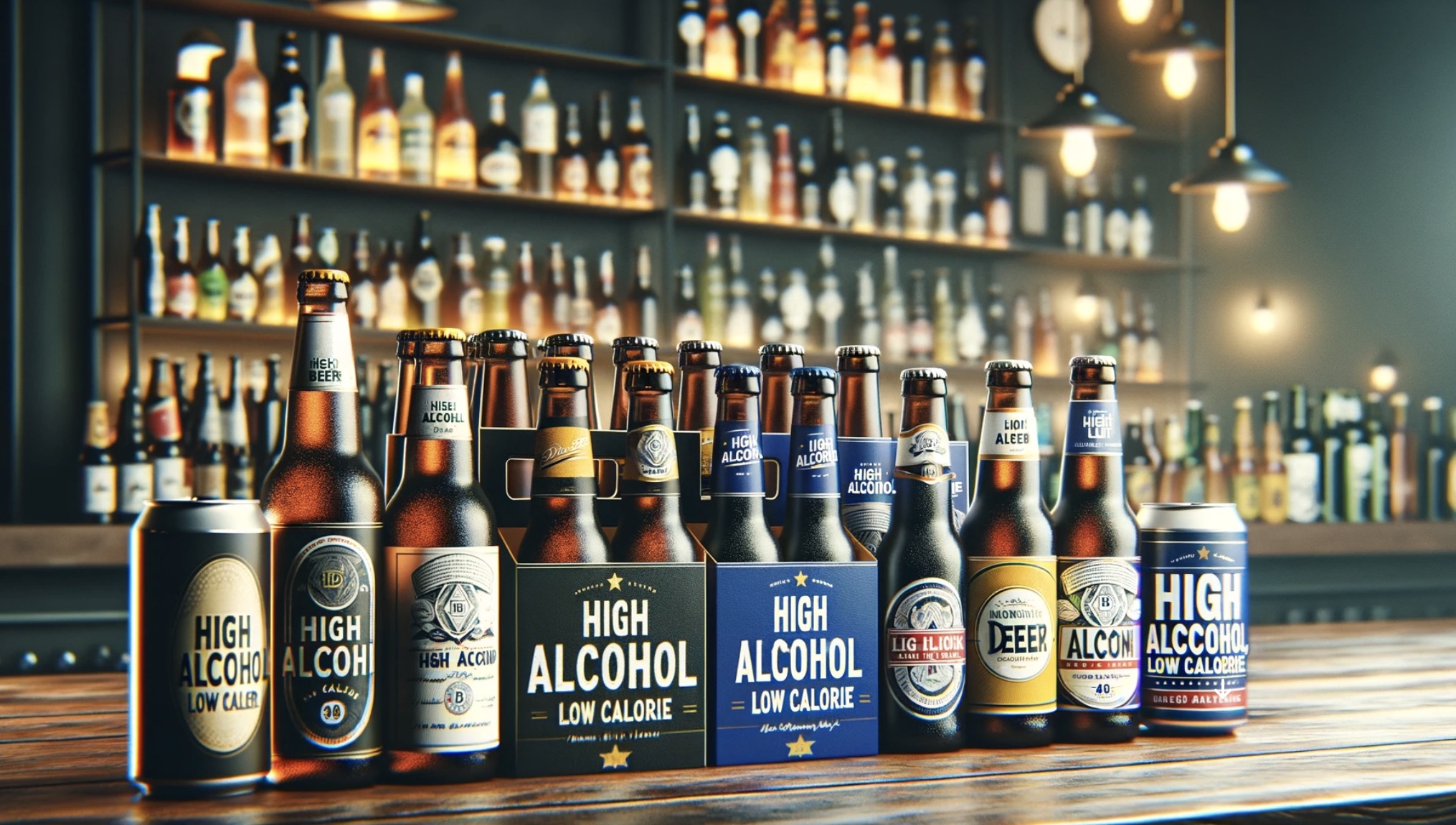If you’re totally new to home brewing it can seem confusing how cider and beer are different. And though there are many differences that separate them, in this article I will tell you how they differ but also how they can end up tasting quite similar to each other!
Strictly speaking, hard cider is a kind of alcoholic drink made from fermented apple juice, whilst beer is made from the fermentation of grain mash. Grain mash consists of malted barley or other cereals, as well as hops, which add bitterness and act as a natural preservative.
So unless the beer is fermented with lactic acid bacteria, as is the case for sour beers such as those of the Lambics or Gose beers, it will not have the sour and fruity qualities of wine and cider.
The addition of hops is not a hard requirement as this can also be added to cider and is sometimes left out in beer (although some “bitter” ingredient is almost always used).
A Brief History of Beer and Cider
Beer brewing is an ancient process that has been around for thousands of years. The first recorded instance of beer brewing is from the Sumerian city of Uruk in Mesopotamia, which dates back to around 3,900 BC.
In ancient Egypt, beer was brewed using barley and other grains and was a staple part of the diet. The Romans also brewed beer and it slowly became a popular drink among all classes of society in the Roman Empire.
After the fall of Rome, beer brewing became more widespread in Europe as monks began to brew it for their own consumption and for sale to the public.
Beer became an important part of daily life in many European countries, and different styles and traditions developed in different regions.

In the United States, beer brewing was brought over by European immigrants in the colonial era, and American brewers began to experiment with new ingredients and techniques.
Today, there are hundreds of different breweries around the world producing a wide variety of beers.
Cider brewing has a long and rich history dating back to ancient times but is not as old as that of beer brewing.
Early cider was made by crushing apples and fermenting the juice using only the wild yeast present on the apples.
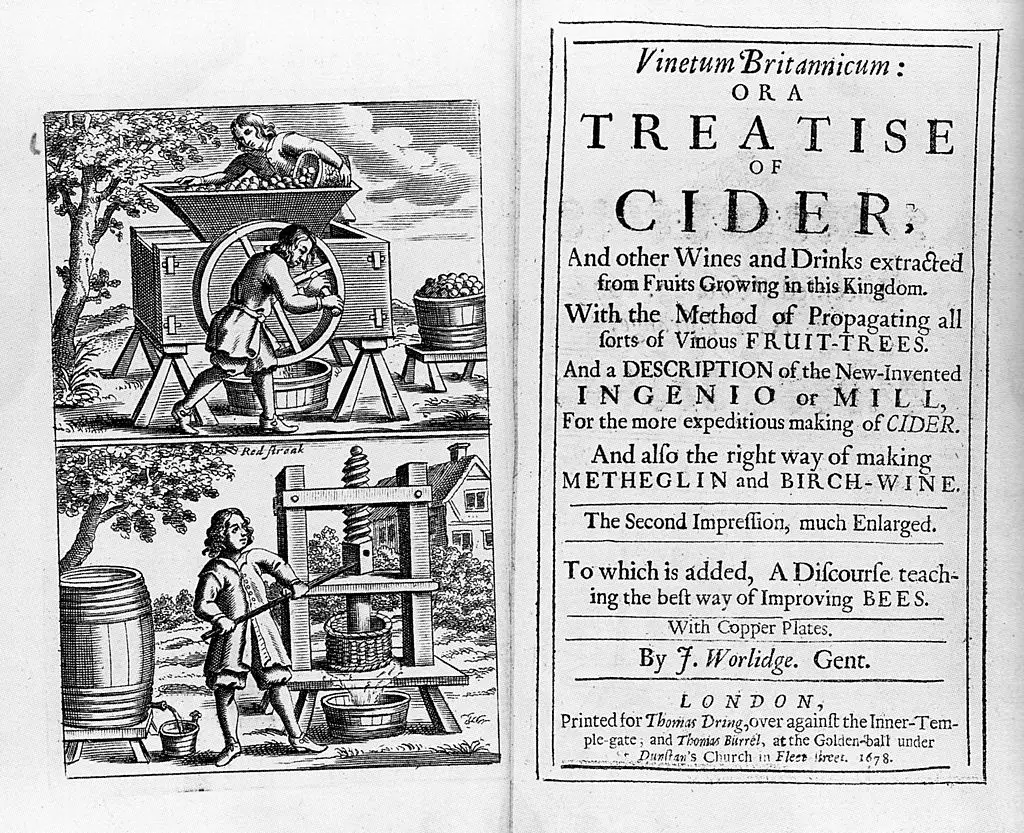
Folger Shakespeare Library, 1999; original 1678, Public domain, via Wikimedia Commons
This primitive method of cider making was likely first developed in the Middle East or Asia and then spread to Europe via trade routes.
The Romans were particularly fond of cider and introduced it to Britain when they invaded in 43 AD.
The finished cider was a light, refreshing drink that was very popular with the people of England. Over time, the process of brewing cider became more refined and the cider became even more popular.
Today, there are many different types of cider available, each with its own unique flavor.
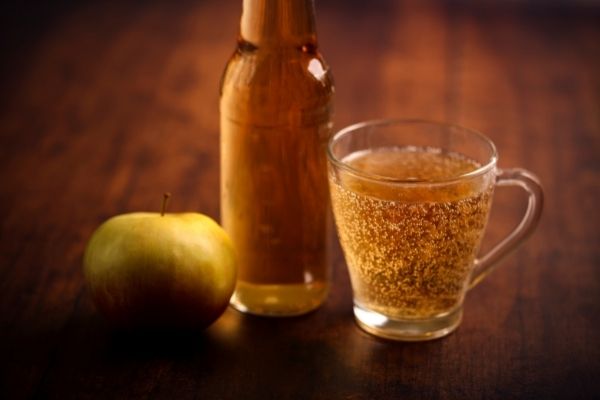
Cider-making remained a largely regional affair until the 18th century, when mechanization and advances in transportation made it possible to mass-produce cider on a larger scale.
This led to the development of new cider styles, such as dry cider and sparkling cider as a further development owed to the champagne-style bottles invented – before that, all ciders were enjoyed still (non-carbonated)!
Today, cider is enjoyed all over the world, with different regions specializing in their own unique styles.
What defines beer?
When it comes to defining cider and beer, both have a specific definition based on the main ingredients used in their fermentation. For beer, these ingredients are water, grains, hops, and yeast!
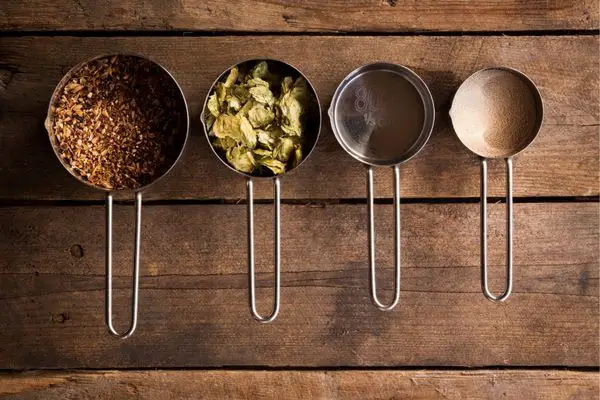
It’s the starches in the grains that turn into sugar through the process of mashing. After this, these natural sugars are eaten by the yeast and turn into alcohol. If you’re wondering if cider is a type of beer, it’s not. Cider is made from fruit juice which already contains natural sugars.
This is why cider is not a type of beer. The yeast that’s added, causes the fermentation to happen sooner since the sugar is already there. This is why there’s no need to use grain when making cider. Some cider recipes will recommend adding raw sugar to speed up the alcohol fermentation.
Is cider a type of beer?
No, cider is not a type of beer. Cider is made from apples, while beer is made from grain – this is the main difference!
The two drinks are brewed differently and have different flavors. While beer brewing is a complicated process, cider is more ancient in history and requires little more than the juice of apples (or pears).
What defines hard cider?
Hard cider is defined as fruit wine made from either apples or pears. With or without bubbles! Other fruit wines can, strictly speaking, not be called cider in the traditional sense.
For example, a strawberry wine with bubbles is not a cider. And pear cider is also sometimes called “Perry” rather than cider.

But an apple wine without bubbles can be regarded as a premium cider and is the norm in large parts of Spain!
So, cider is defined by the specific type of fruit used to create the hard cider or fruit wine. And while most often made from fresh apple juice, pear is also approved.
Does a cider have to be made from apples?
Depending on the type of cider that’s being brewed, select varieties of pears and apples can be used to get different flavors of cider and other fruits may be mixed into a certain percentage.
However, no other fruits than apples and pears can be used to make traditional cider if the original definition is to be respected.
Some people would define cider as strictly made from apples and apples only. Some would even insist that the apples should be of a specific cultivar and the juice to be fermented in a specific way in order for the fermented product to be called “real” cider.
Others would also include pears as an acceptable raw material for cider production. But then again, some would insist on calling this drink “Perry” instead of cider.
Cider can also include pear, yet most of the time, apples are used. In a nutshell, everyone agrees on the basic definition that cider is fruit wine made from apples.
Do any ciders taste like beer?
There are indeed combinations of beer and cider that can turn our quite successful.
However, not too many home brewers are looking to make their cider taste like beer, but it’s not out of the question to make hopped cider, which has the bitter aromatic flavors of hops often associated with IPA beers.
That hasn’t stopped some adventurous brewers from making experiments using hops and isomerized hop oil to get that bitterness that goes with beer flavors.
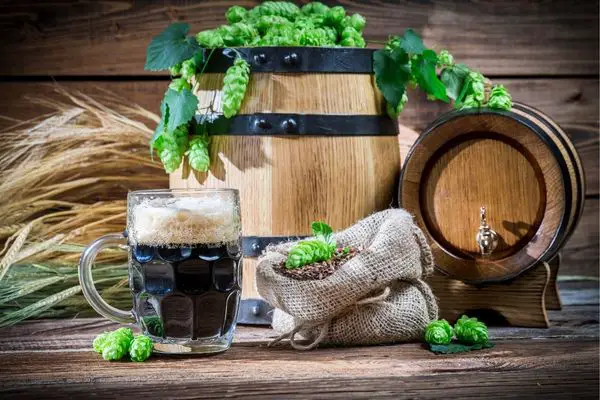
The hops are often added to cider during or after fermentation to perform so-called “dry-hopping”, meaning that it does not boil to extract taste as is the case for beer. It could be called “cold hopping” instead to make more sense.
Another good tip if you want your cider to taste more like beer is to use English beer yeast does have an effect that makes cider beer-like. In some cider circles, some cider fans have tried recreating Graf.
This is a combination concoction that is somewhere between cider and beer. It uses clean ale yeast and hops to achieve a Belgian-like beer. Then again, it’s all up to your interpretation of what beer-like flavors you want in your cider.
What is the difference between cider and beer?
The obvious difference between cider and beer is the raw materials used as well as the actual taste.
You can immediately taste that cider is made from apples, while beer is made from grains. Cider can be very complex in its taste and smell profile, but there are few overlaps with beer.
This is the real reason why beer is not included in the cider category simply due to using grains instead of apples to fuel the fermentation.
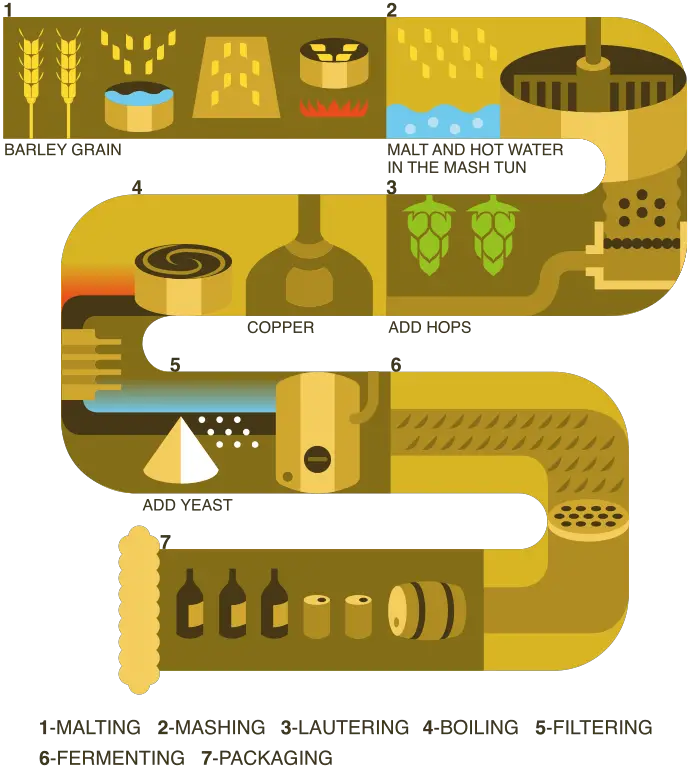
It’s the grains such as barley, wheat, or oats as well as the hops that give the beer an unmistakable beer flavor, whereas cider is sweet, fruity, and usually much less bitter, and maybe still or sparkling.
Beer always has bubbles, while cider can also be still. And even though there are hybrids of beer and fruit that can be made, it still tastes like beer, and the sugars predominantly come from the grains used.
Cider is also often allowed to ferment longer than beer to create the slightly stronger drink most people know, and it can also be frozen to create the stronger ice cider or applejack.
This concentration of alcohol and flavors is usually not being done with beer and longer fermentations with added sugar can typically ruin the flavors of beer, but often does ok with cider.
However, do keep in mind that this “distillation” process is actually illegal without permission, but surprisingly more so when done to cider than to beer!
This is why cider naturally has an advantage over beer when being fermented and stored for long periods of time.
Beer will also have a spectrum of colors that range from light amber to dark brown. You can spot cider easily from the sediment if it’s not filtered and can range within yellow, orange, and brown shades.
The sugar content is often noticeable when drinking cider although it is often compared to that of beer. But due to the more complex nature of the sugars/carbohydrates in beer, beer just doesn’t taste so sweet.
Is brewing cider the same as brewing beer?
No. Even if the steps to make cider and beer are not very complicated, making beer is not the same as making cider. Making any good cider is only simple and convenient if you have all of the right supplies.
It’s just like Ron Popeil used to say: “Set it and then forget it!”
There is not much else to do when brewing cider is concerned. When it comes to making beer, it’s a love of the art that becomes the real quest. The preparation of the grains before brewing is key.
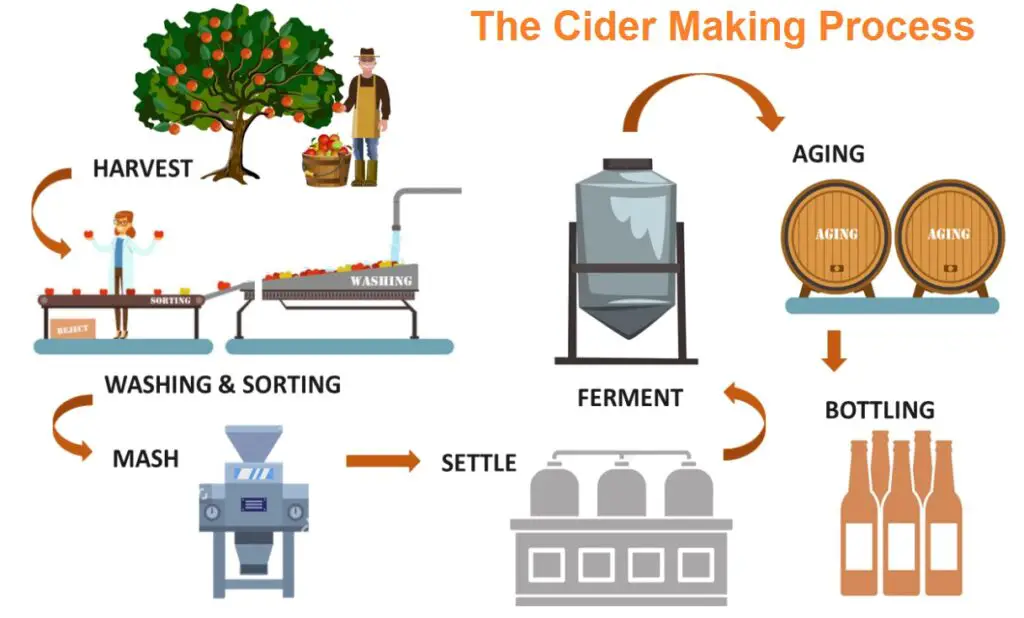
But not only the process, but more about the variety of delicate flavors that can be created. Making beer is also a waiting game that does require knowing what supplies and steps are needed to get the process started.
Depending on your end goal, you can make the process more or less complicated by, for example, aging the cider in oak barrels to increase taste complexity.
How is brewing cider different from beer?
Cider brewing is different because the only main ingredient is freshly squeezed apple juice and some yeast.
Apart from that, it’s all about using the right cider-making supplies to ensure you have a cider that will ferment and taste the way you like it.
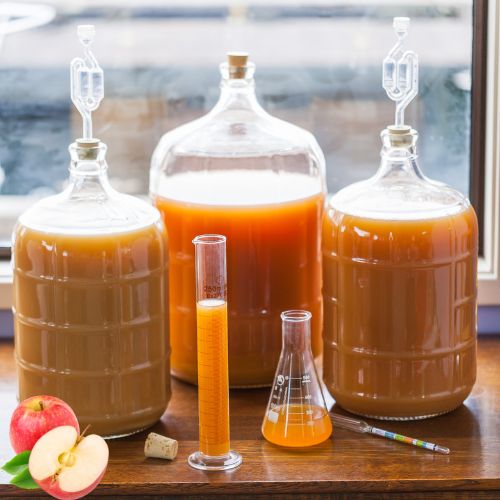
This is why making cider is so much easier than making beer. Just to get started with a beer mash, you need all of the ingredients for making beer and then precise equipment to heat them up to get the starches to convert into sugar without running the mash.
Once you’ve done this job, the yeast that is added will finally begin to create the fermentation that makes alcohol.
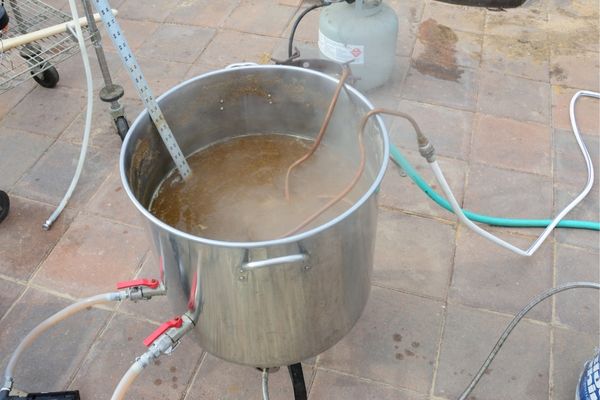
The whole boiling process involved in making beer has a very different smell to it than the slow fermentation process of cider which may at worst smell a bit like sulfur.
Making hard cider isn’t actually hard, but may be just as rewarding as making beer. Suffice to say that you really need to love beer to make it yourself.
Is apple beer the same as cider?
If you’ve heard of apple beer, you might be confusing this with a product that uses the same name. It’s a product from Germany that is non-alcoholic and is essentially an apple-flavored gourmet soda.
It’s just like root beer which creates a thick head of foam that floats on the top just like beer does, except it’s not real cider or beer. Cider does have alcohol that’s fermented to naturally be called cider.
The brands that are sold with any label that mentions apple beer aren’t cider at all. For that matter, any name that is using cider beer isn’t being completely honest.
What is the difference between cider and apple beer?
The main difference between cider and apple beer is the alcohol content. Cider can have as much as 7-8% alcohol by volume. Apple beer is more of a product marketing name than a specific process outcome.
Hard cider tends to be closer to wine (12-15% ABV) and needs to ferment for much longer to reach these levels.
Apple beer is a non-alcoholic drink that has never been made to have alcohol in it, although there is one drink called Redd’s Hard Cider which is sometimes called apple beer and contains 5% ABV.
Apple beer is similar to any other carbonated drink that forms a thick head if you pour it into a cup the right way.
There is no such thing as hopped cider being sold as apple beer currently, but these exist under other names such as “hopped cider”.
Is hard cider more like a beer or a wine?
Hard cider can contain an alcohol content that is similar to wine since the alcohol volume is much higher in some apples than what most mashed grains can provide.
Whereas hard cider has a real vinous taste that can be comparable to wines, comparing wine to beer just doesn’t do these two any justice. Hard cider can also be made without carbonation and will thus be considered “apple wine” by many (although strictly speaking still a cider!).
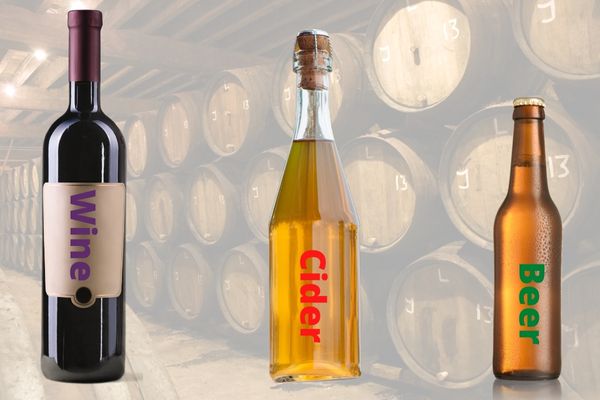
Some people would say that the biggest difference between wine and cider is that you cannot feel the alcohol content in hard cider and can suddenly creep up on you.
Hard cider is also more like wine since the feeling is mellow and relaxing whereas the effect from beer is often the complete opposite.
Some beers do, however, resemble cider or wine more than others because they are brewed using lactic acid bacteria, which are also often present in wild-fermented ciders.
What is the difference between sour beer and cider?
Sour beers are beers that have a high acid content owing to the lactic acid bacteria present during fermentation.
Beers are normally not sour as they are fermented exclusively with yeast and the sugar is converted to alcohol instead of lactic acid.
Although fruit juice is sometimes added to imitate the acidity of a true sour beer, this is not traditionally how sour beers are made.

Traditionally sour beers like gose, lambics, gueuzes, and Berliner Weiss beers are made using a mix of yeast and lactic acid bacteria to produce some amount of lactic acid.
This is done either by keeping the fermentation vessel open to the spontaneous influx of bacteria from the air (wild fermentation), which is done for some lambic beers, while gose beers will have their bacteria added in a controlled manner.
This means that Gose sour beers are not truly “spontaneously” fermented as the lactic acid bacteria and yeast are added to them, the lambic beers are traditionally fermented in a less controlled manner by “contamination” with wild yeasts and bacteria from the surroundings.
Furthermore, these sour beers are often treated more like wine or cider than as beer, and lambics are sometimes stored for decades in oak barrels before they are served!
What is the difference between cider and ale?
Just like for normal beer, you need to start with a mash of grains and hops that are prepared using boiling water to make ale. Ale is just beer that is fermented faster at higher temperatures.
To make cider, you don’t need to do anything special aside from adding the yeast to fresh apple juice.
The fermentation process of cider will complete the transition into becoming an alcoholic beverage all by itself. Ale must be prepared by heating a mash to start converting the grains into sugars.
After this is completed, the sugars that come from grains will react with the yeast and slowly convert them into alcohol.
Whereas ale is faster to brew than beer, cider can be brewed in the same time span of 3-8 weeks it takes to brew ale.
FAQs
Are ciders stronger than beer? Which has more alcohol?
Yes, because the juice used to make hard cider will most often have more sugar than what is released from grain mashing, cider will be slightly stronger than beer.
However, due to the different apple and grain types, the variation in alcohol content overlaps quite a lot.
Whereas the average beer has an alcohol content of around 4.5%, the average cider alcohol content is slightly higher at around 5.5% and 6% for craft ciders.
There are, however, beers with higher alcohol contents such as the Belgian style beers and also stronger ciders of up to 15%, but these are not common and are more often referred to as apple wines or ice cider.
Sugar in cider vs. beer
In theory, all the fermentable sugars should be gone in both cider and beer upon the end of fermentation.
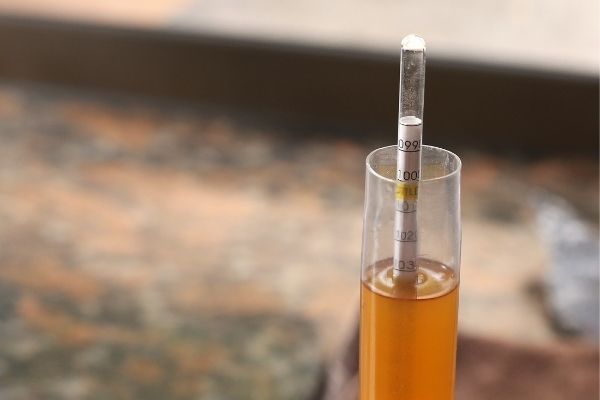
In beer, however, there are more complex carbohydrates and in cider and some of these will be left unfermented but will not taste as sweet as some of the actual sugars that may be left in cider.
The fruit juice used to make cider will also contain an amount (1-5%) sugar alcohols that will not be fermented but still contribute to calories and the sweet taste!
Are ciders healthier than beer?
Because cider is made from raw fruit juice, many of the polyphenols and vitamins are left intact and with the sugars gone through fermentation, there is only the healthy stuff left right?
Spoiler: alcohol is not necessarily healthier than sugar, but it can be a healthy part of a normal diet in small amounts.
Beer is more like bread in the sense that it contains grains instead of fruit and that can be tolerated less by some people.
For example, I am actually allergic to apples but I can easily drink apple cider without any adverse reactions. However, my friends who are gluten intolerant cannot easily drink beer.
Why does cider taste better than beer?
Many people would regard the taste of cider as better than beer because beer is inherently bitter and less sweet in its taste.
However, this is strongly subjective and some people love the sour complex taste of cider, while others love the bitterness of beer.
Cider can be made sweeter than beer, and will then attract a broader audience that does not quite like beer or wine (yet!).
Is cider better than beer?
That’s a very subjective question! I tend to like cider better than beer, but mostly because I brew a lot of it myself!
If you’re allergic to gluten, then cider is the obvious choice!
Some people would say that cider is more accessible and mild, but this is only the case for some commercial ciders.
Real craft ciders will often have complex wine-like flavors that are not always well accepted by the younger audience.

